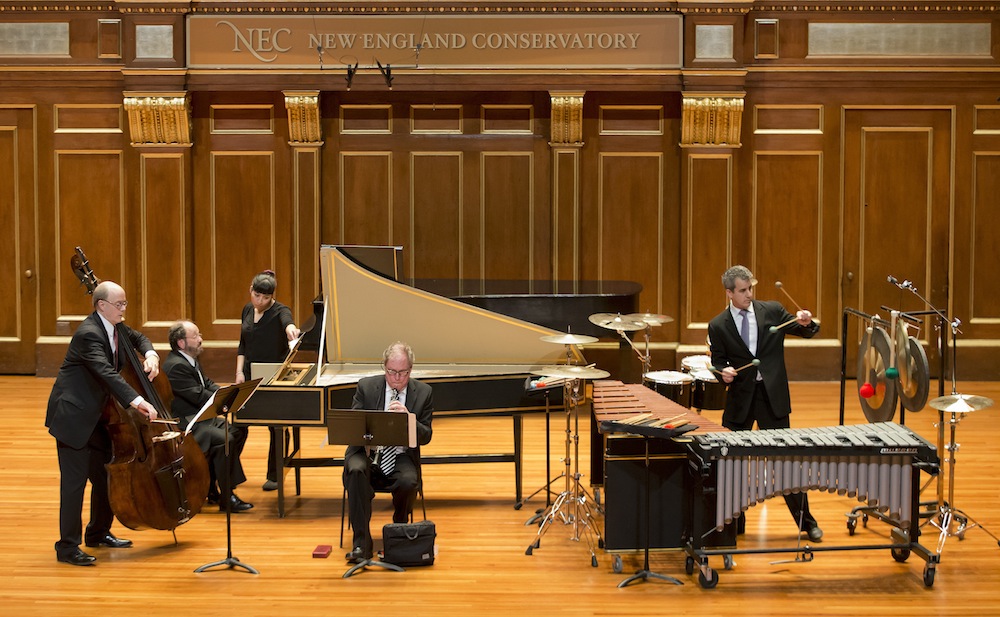Boston Symphony Chamber Players completely at home in homage to Dutilleux

Boston Symphony Chambers Players performed Dutilleux’s “Les Citations” Sunday at Jordan Hall. Photo: Winslow Townson
In his long creative life, Henri Dutilleux followed the path blazed by Debussy and Ravel. Yet his place in the history of modern music is a solitary one.
Long before his death in 2013, he developed a personal musical voice, one that retained the color and dreamy soundscapes of the impressionists while at the same time giving a nod to the spiky sonorities that define the styles of Messiaen and Boulez.
Dutilleux’s music was the focus of a Sunday afternoon concert at Jordan Hall given by the Boston Symphony Chamber Players to celebrate the composer’s centennial.
Dutilleux was a fierce critic of his own music, which resulted in the destruction of many early works. In all, only a dozen or so pieces survive.
Among those are a handful of duo works for solo instruments with piano accompaniment, written for the Paris Conservatoire. The Sonatine for flute and piano, Sarabande et Cortège for bassoon and piano, and Choral, Cadence et Fugato for trombone and piano, all heard Sunday, recall an early twentieth-century neoclassicism with hints of clean, Stravinsky-like textures and whiffs of jazzy harmony.
Of those, the Sonatine is a masterwork, a quality that was especially present given the splendid performance by flutist Elizabeth Rowe.
Throughout, her playing was colorful, with velvety low register and a bright, shimmering high range. In the free-flowing sections, Rowe tossed off rapid calls and multi-tongue passages with ease. The final movement, entitled Animé, was particularly impressive. There, Rowe handled the winding lines with light touch only to build the phrases into a frenzied conclusion.
The Choral, Cadence et Fugato is equally appealing. Trombonist Toby Oft played with a warm, rosy tone that brought weight and shape to Dutilleux’s melodies. In the cadenza, Oft sounded his statements in tones of blistering intensity.
The most beautiful of these pieces is the Sarabande et Cortège, a work that shows Dutilleux at his most tenderly melodic. The silky melodies, which bear a hint of Ravel’s style, seemed to hover in the air like mist. Bassoonist Richard Svoboda gave a haunting performance, taking care to answer the gentle bouncing figures coming from the piano accompaniment.
In each work, pianist Randall Hodgkinson proved a sensitive partner, finding the dance-like touch of Sarabande et Cortège, the plaintive soundscapes of Choral, Cadence et Fugato, and the power of the thick dissonances in the Sonatine.
Later in his career, Dutilleux turned increasingly to the thorny textures and spiky harmonies that frequent the music of the French avant-garde. One such piece in this style is Les Citations.
Begun in 1985 and reworked as recently as 2010, this ensemble work scored for the unusual combination of oboe, harpsichord, percussion, and double bass is one of Dutilleux’s most remarkable scores. It’s also a piece the Chamber Players know well, having recorded it in 2011.
The work is a collage of colorful effects, featuring angular phrases for marimba, rhythmic dialogue between tom-toms and double bass, harpsichord dissonances that are rich in overtones, and a mournful oboe line that wanders and settles into a different key from the rest.
The Chamber Players—John Ferrillo (oboe), Mark Kroll (harpsichord), Timothy Genis (percussion), and Edwin Barker (double bass)—provided an exciting and polished rendering.
Filling out the concert were works by Ravel and Dukas.
Dukas’ Villanelle for horn and piano features sweeping melodies for both instruments. Hornist James Sommerville sounded the fanfare-like calls with the robust power of a hunter’s horn. His performance of the principal theme was sweet and shaped in a singing style with light dynamic shading.
Here too, Hodgkinson proved an equal partner, supplying a piano accompaniment that evoked Dukas’ orchestral-like textures.
That quality was especially present in Sunday’s performance of Ravel’s Trois Poèmes des Stéphane Mallarmé.
The vocal soloist was John Brancy, who sang with a light, supple baritone that was appropriate for the haunted tones of “Soupir” and “Surgi de la croupe et du bond.”
The singer had some trouble finding the center of pitch on his high phrases. But his most affecting singing came in the rich tones of the second song, “Placet futile.” There his voice took on a chocolaty quality that mined the love-torn angst that roils beneath the poem’s surface. In support, Conductor Moritz Gnann wove a silky bed of accompaniment from the ensemble.
The closer, Ravel’s popular Introduction and Allegro, was astounding, the Chamber Players giving it a richly evocative and burbling reading. Tempos were nimble, yet the phrases managed to ebb and flow like gentle waves.
At the heart of this piece was harpist Jessica Zhou, who supplied golden strands of melody. Her cadenza was spellbinding, her lines adorned with well-placed harmonics.
The Boston Symphony Chamber Players will perform an all-Beethoven program with pianist Garrick Ohlsson 3 p.m. March 13 at Jordan Hall. bso.org; 617-266-1200.
Posted in Performances




